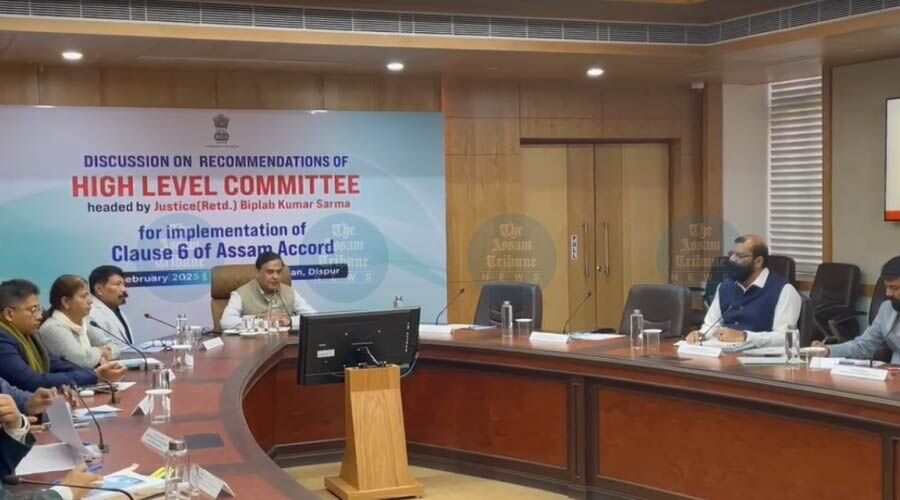
Guwahati, Feb 16: The Assam government has taken significant steps toward implementing Clause 6 of the Assam Accord, following discussions with the leadership of the All Assam Students' Union (AASU). In a high-level meeting chaired by Chief Minister Himanta Biswa Sarma, the government and AASU deliberated on 38 key recommendations from the Biplab Sharma Commission report.
The discussions focused on safeguarding the rights of indigenous Assamese people, with critical decisions taken on land rights, language policies, cultural protection, and administrative reforms. Talks are scheduled to resume by March 10, with further discussions on the remaining recommendations.
One of the major decisions taken in the meeting was the creation of new revenue circles modeled after tribal belt blocks, ensuring that only Assamese people will have land rights in these areas.
Speaking on the decision, AASU chief advisor Samujjal Kumar Bhattacharya stated: “The land is protected for tribal belt blocks. But what will happen to the land apart from the belt blocks? The Biplab Sharma Committee recommended revenue circles where land deals would be clearly defined for the indigenous people of Assam. Today, the Assam government took this step, and I believe this is a major step forward in guaranteeing land rights in the hands of the indigenous people.”
The meeting also saw a major decision regarding language policies. Assamese will be made compulsory in all English-medium schools across the Brahmaputra Valley, while in the Bodoland Territorial Council (BTC) area, both Assamese and Bodo will be mandatory languages.
Additionally, the history of Assamese people will be introduced as a subject up to the 8th standard from the 2026 academic year.
In an effort to enhance the prominence of the Assamese language, the government has also decided that from April 14, all official notifications of the Assam government will be published in both English and Assamese. A Directorate of State Languages will be established as an independent body to oversee this implementation.
The Assam government has also announced new initiatives to promote Assamese literature and cultural heritage. As part of these efforts, the Assamese departments at Tezpur University and Assam University (Silchar) will be expanded, with a Padmanath Gohainbarua Chair established at Tezpur University and a Laxminath Bezbaruah Chair set up at Assam University, Silchar. Additionally, religious institutions like Satras and Namghars will be given statutory protection, with a five-member State Board constituted to oversee their administration and welfare.
To support cultural development, the government has announced a Rs 100 crore fund for Sankardev Kalakshetra. In a significant administrative decision, employees of Jyoti Chitraban, Assam’s state-run film archive and studio, will now be brought under the government payroll.
Additionally, 2,000 new government posts will be created for land-related administrative work, ensuring better implementation of the new land policies.
Speaking on the importance of these decisions, AASU leader Utpal Sarma said, "Today, there was a discussion between the Assam government and AASU under the direction of Assam CM Himanta Biswa Sarma. Out of 52 recommendations, 38 were discussed. There were also deliberations on how these 38 recommendations will be implemented.”
Meanwhile, Samujjal Kumar Bhattacharya stressed the need to safeguard Assamese identity, "It is certain that the khilonjiya (indigenous) people of Assam must have dominance over the land of Assam. Constitutional safeguards for the indigenous people are crucial", he concluded.